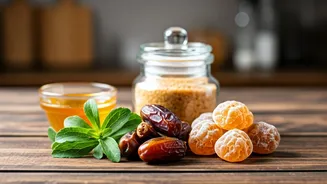Understanding Sweeteners' Impact
The consumption of sugar and alternative sweeteners significantly affects our overall health and wellness. The choice between these different options can be challenging,
given the variety of choices available. Sugar, for example, is a common ingredient in many foods and beverages, but excessive consumption is linked to health problems like weight gain, type 2 diabetes, and heart disease. While sugar provides immediate energy, it lacks essential nutrients. In contrast, natural sweeteners like honey and dates, alongside artificial options like stevia and monk fruit, offer alternative ways to satisfy sweet cravings with potentially different health effects. Understanding these effects is key to making informed dietary choices. Furthermore, the glycemic index (GI) and glycemic load (GL) of a sweetener are vital aspects to consider. The GI measures how quickly a food raises blood glucose levels, while GL considers the amount of carbohydrates in a serving. Low GI and GL sweeteners are often preferred because they cause a slower, more gradual increase in blood sugar, preventing energy crashes and reducing the risk of insulin resistance.
Sugar: The Baseline Reality
Table sugar, or sucrose, is a refined carbohydrate often extracted from sugarcane or sugar beets. It's a fundamental element in countless processed foods, snacks, and beverages. Sugar provides the body with instant energy, but this energy comes with a significant drawback: a lack of essential nutrients. Its high caloric content and minimal nutritional value mean that excessive intake contributes to weight gain and elevates the risk of chronic conditions. Furthermore, the rapid absorption of sugar can cause spikes and subsequent crashes in blood sugar levels, leading to energy fluctuations and potentially increasing the desire for more sweet treats. From a health perspective, it's wise to limit added sugar in your diet to avoid adverse health consequences. This is easier said than done, as added sugars often hide within unsuspecting foods, such as sauces and pre-packaged meals. Being aware of the hidden sugar content helps one to take control of their sugar consumption.
Jaggery's Nutritional Profile
Jaggery, an unrefined sugar commonly used in India, is made from sugarcane juice or palm sap. Unlike refined sugar, jaggery retains some of the molasses, which imparts it a richer flavor and color. Because jaggery is not processed with chemicals, it retains trace minerals like iron, magnesium, and potassium, which are lost during the refining of sugar. While it does offer some nutritional benefits compared to sugar, it is still primarily composed of carbohydrates. This means that, like sugar, jaggery can contribute to increased blood sugar levels if consumed in large amounts. The glycemic index of jaggery is also relatively high, though it may be slightly lower than that of refined sugar. Jaggery is often considered a healthier alternative because of its trace nutrients and slow-release energy, but it should still be consumed in moderation as part of a balanced diet. Its distinct flavor also makes it an excellent choice for adding depth to certain dishes, particularly traditional Indian sweets.
Dates: Nature's Sweet Treat
Dates are natural, whole-food sweeteners, packed with fiber and various essential nutrients, including potassium, magnesium, and antioxidants. They provide sweetness alongside additional health benefits, which is a major difference when compared to refined sugar. The fiber in dates helps slow down sugar absorption, which leads to a more gradual rise in blood sugar levels. This makes dates a better choice for blood sugar management than refined sugar. Besides their nutritional benefits, dates are also an excellent source of energy, making them a great snack before or after exercise. Dates have a high natural sugar content, so mindful portion control is important. The addition of dates in your diet not only satisfies your sweet tooth but also offers some fiber and key nutrients, making them a healthier choice compared to many other sweeteners. The versatility of dates means they can be blended into smoothies, used as a natural sweetener in baked goods, or eaten directly as a snack.
Honey's Varied Benefits
Honey is a natural sweetener produced by bees from flower nectar. It is celebrated for its unique flavor and potential health benefits. Honey contains trace amounts of vitamins and minerals, as well as antioxidants. These antioxidants have anti-inflammatory properties that can help protect cells from damage. The exact nutritional profile of honey varies depending on the floral source. Honey is also known for its antibacterial and antifungal properties, making it useful for soothing sore throats and treating minor wounds. However, it's important to remember that honey is still primarily a source of sugar and contains a high number of calories. The glycemic index of honey can vary, but generally, it is slightly lower than that of refined sugar, but this can depend on the processing and the floral source. Choosing raw, unprocessed honey can provide the most benefits, as it retains more of its natural enzymes and nutrients. While honey offers some additional benefits when compared to refined sugar, it should be consumed moderately as part of a balanced diet, keeping in mind its high caloric content.
Stevia: Zero-Calorie Sweetness
Stevia is a natural sweetener that is extracted from the leaves of the Stevia rebaudiana plant. Its major advantage is its zero-calorie content and its impact on blood sugar levels. Stevia is non-nutritive, which means it provides sweetness without adding calories. This is beneficial for people trying to manage their weight or blood sugar. Because stevia does not raise blood sugar levels, it is a suitable option for people with diabetes or those following low-carbohydrate diets. The sweetness of stevia is significantly more intense compared to sugar, so only a small amount is needed to achieve the desired level of sweetness. Though considered safe by regulatory bodies, some people experience an aftertaste. The use of stevia can be a useful tool for managing calorie intake and blood sugar control. It is often used in packaged foods, beverages, and baked goods, but it is best to use it in moderation.
Monk Fruit: Another Option
Monk fruit sweetener comes from a plant native to China and Thailand. It has gained popularity as a natural, zero-calorie sweetener. Like stevia, monk fruit sweetener does not affect blood sugar levels, making it suitable for people with diabetes or those managing their blood sugar. It's considered to have a pleasant taste profile, with no bitter aftertaste, as it is extracted from the fruit. Monk fruit sweeteners are derived from the fruit's extract and do not contain any added sugars. They are also considered safe by most regulatory bodies. This makes them a useful alternative to sugar and artificial sweeteners. Monk fruit offers another option for those looking for sugar substitutes. They provide sweetness without the added calories or impact on blood sugar. The versatility, appealing taste profile, and lack of effect on blood sugar make monk fruit an increasingly popular sugar substitute.
Making Informed Choices
The 'healthiest' choice of sweetener depends on an individual's specific health goals, dietary needs, and lifestyle. For those trying to limit calorie intake or manage blood sugar levels, stevia and monk fruit are ideal choices because they have minimal impact on blood sugar and are calorie-free. However, it's important to note that these sweeteners may lack the natural nutrients found in options like honey and dates. Honey and dates can be better choices if you're looking for natural options that offer additional nutrients like vitamins and minerals. Yet, since these sweeteners are high in calories and can impact blood sugar levels, they should be consumed moderately. Jaggery offers some nutritional benefits over refined sugar because it contains some trace minerals, but it is still high in sugar and calories. Ultimately, the best choice is not just about the sweetener itself but also about the overall diet. It is critical to consume sweeteners in moderation, regardless of their source, while prioritizing a balanced diet.
Practical Dietary Tips
Making informed sweetener choices is important, but it is equally vital to adopt practical dietary strategies for improved health and well-being. Start by reading food labels carefully, looking for hidden sugars, and assessing the overall sugar content in packaged products. It's often helpful to reduce sugar gradually instead of making drastic changes. Gradually reducing the amount of sugar in your diet will help your taste buds adjust to lower levels of sweetness, making healthier options more enjoyable over time. Choose whole, unprocessed foods like fresh fruits and vegetables, which naturally provide sweetness and essential nutrients. When using sweeteners, practice portion control. You can achieve this by measuring your sweeteners or by limiting the amount you use in recipes. Drink plenty of water as a way to stay hydrated and can also help control sugar cravings. Prioritize consuming a balanced diet rich in protein, healthy fats, and fiber-rich foods, which help stabilize blood sugar levels. This strategy can reduce the dependence on sweeteners. By following these practical tips, you can make sustainable dietary changes that benefit your health.



















